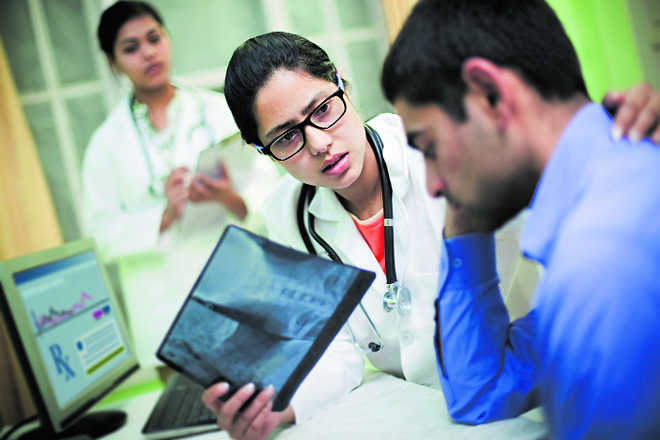
right to know: A doctor is duty-bound to inform the patient about the diagnosis and the treatment. — Istock.photo
Pushpa Girimaji
Do we have a specific law enumerating the rights of patients vis-à-vis medical services? Can you please give details of the law and the rights of patients under it?
Unfortunately, we do not have a law on patients’ rights, even though consumer groups have been demanding one such law for long. In fact, several countries around the world have recognised the rights of patients through specific laws or charters. The European Charter of Patients Rights, for example, recognises fourteen rights of patients, including the right to choice, right to information, right to consent, right to privacy and confidentiality, right to respect of patients’ time, right to safety, right to compensation and the right to participate in policymaking in the area of health.
Historically, patient rights flow from the Universal Declaration of Human Rights adopted by the United Nations General Assembly way back in 1948 and since then, several countries around the world have given a legal framework to these rights. Israel, for example, has a comprehensive Patients Rights Act while Japan has Patients’ Rights Ombudsman. In India, even though the government is yet to turn its attention to this crucial aspect pertaining to patient-physician relationship, the courts, particularly the consumer courts, have stepped in to protect the patients. Their orders have helped define the rights of patients.
Can you please quote some of the judgements of the consumer courts pertaining to patients’ rights?
I would begin with Parmanand Katara Vs Union of India (Supreme Court, 1989) where the apex court accorded the right to emergency medical treatment the status of a fundamental right under Article 21 (right to life). In other words, failure to provide timely medical treatment in emergency cases violated the patients’ right to life guaranteed under Article 21, the apex court said.
In Pravat Kumar Mukherjee Vs Ruby General Hospital (OP No 909 of 2002), the highest consumer court, the National Consumer Disputes Redressal Commission, held that a hospital that denied emergency medical treatment to a patient was guilty of negligence under the Consumer Protection Act. The law provides for compensation to victims of medical negligence.
Similarly, the patient’s right to information and informed choice got a big boost in Dr Shyam Kumar Vs Rameshbhai Harmanbhai Kachhiya (RP No 1486 of 2001), wherein the National Commission made it clear that a ‘doctor was duty-bound to inform the patient about the diagnosis and the treatment and also help the patient make an informed choice with regard to his/her treatment’.
In SR Shivaprakash Vs Wockardt Hospital, Mumbai (OP No 208 of 1993), the Commission held that the hospital as well as the doctor have an obligation to provide all medical records pertaining to the treatment to the patient or the relatives. A failure to furnish the records would open the hospital and the doctor to the charge of deficiency in service, the commission said.
In Dr VK Ghodekar Vs Sumitra Prahlad Korgaonkar (RP No 1727 of 2002), the highest consumer court in the country underscored the right of the patient to all basic and vital information pertaining to the drugs prescribed, including contraindications. Doctors who fail to respect this right have to face the consequences, the Commission said.
In Varadhan S Nair Vs Dr (Mrs) Remani Rajan and Ors (OP no 123 of 1997), the National Commission came down heavily upon doctors and hospitals that resorted to unnecessary surgical procedure and said those that who resort to surgical procedure more on a commercial consideration than on the health of the patients, are guilty of negligence.
It is mandatory for hospitals to take the written consent of the patient (or a close relative if the patient is not in a position to give the consent) before starting any medical procedure. And this consent has to be an ‘informed consent’. In the 2008 Samira Kohli Vs Dr Prabha Manchanda and Anr (2 SCC) case, the Supreme Court made it clear that the consent should be on the basis of ‘adequate information’ so that the patient knew what he/she was consenting to. While these are all extremely important judgements that have established the basic rights of patients, I would still argue for a strong law on patients’ rights in our country. Consumers, in fact, should lobby for such a law.



























